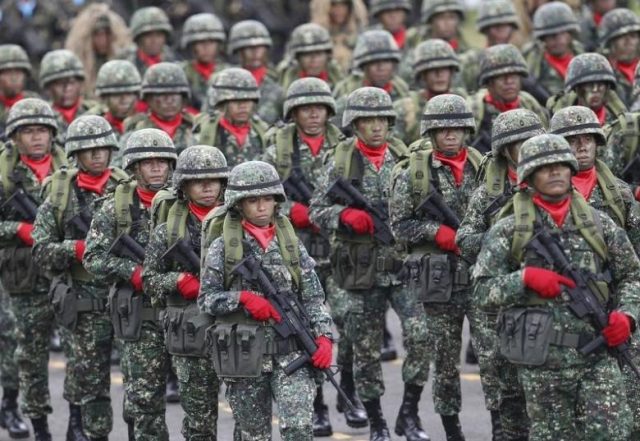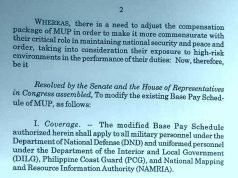MANILA – The Senate approved Wednesday on third and final reading two resolutions seeking to increase the base salary of military and uniformed personnel (MUP) starting January next year and calling for a review of the salary scheme of civilian personnel.
The Senate approval followed a similar move by the House of Representatives, but sparked a warning by a party-list representative that the near-doubling of the base pay of the uniformed personnel would cause serious distortions between them and the over a million civilian personnel in the State sector.
The Senate apparently recognized this, so that right after approving Senate Joint Resolution 11 — introduced by Senate President Aquilino “Koko” Pimentel III, Panfilo Lacson, Gregorio Honasan II and Cynthia Villar — increasing the base pay of MUP, the Senate also considered a separate resolution pushed by Minority Leader Frank Drilon.
Honasan, chairman of the Senate Committee on National Defense and Security and sponsor of the bill, said that once the joint resolution is enacted into law, the base salary of all military and police personnel, including jail guards, firemen, coast guards and those under the National Mapping and Resource Information Authority and the Philippine Public Safety College would double.
“The President has repeatedly made promises of higher salaries to the military and the police personnel. In support of this commitment, this joint resolution, if enacted into law, would double the MUPs base pay,” Honasan said in his sponsorship speech.
He cited a Department of Budget and Management report showing the compensation package would result in an average increase of 58.7 percent for all MUPs.
A joint resolution, like a bill, requires the approval of both houses and the signature of the President. It has the force and effect of a law once approved by the President.
“Let me emphasize that under existing laws, the base pay schedule of military and uniformed personnel or the MUP was last increased eight years ago,” Honasan said.
He said the pay hike for MUPs would motivate those in active service to perform better and be more committed to the service. At the same time, such would encourage civilians to join the service, thereby improving the recruitment process and reinvigorating public service.
“Unlike other vocations, uniformed personnel experience almost daily, risks of losing their lives, physical injury or psychological trauma. Our uniformed personnel including their families give up personal comfort so that ordinary Filipino citizens may live in peace,” he said.
DRILON RESOLUTION
Meanwhile, the Senate also adopted Resolution No.575, authored by Senate Minority Leader Franklin M. Drilon and Senate Majority Leader Vicente Sotto III, to adjust the base pay of civilian personnel.
Drilon said the resolution sought to prevent the discrepancy and distortion in the salary structure of civilian personnel.
The resolution aims to bring the salary of civilian personnel closer to their military and uniformed personnel counterparts, whose base pay will be hiked starting 2018, as Drilon cautioned that the increase in the base pay of the MUP could distort the current pay structure in the government.
Drilon explained that as a result of the increase in the base pay of the uniformed personnel, the salary of entry-level personnel in the miltary would surpass the salaries currently received by some professionals in the bureaucracy including lawyers, nurses, teachers and doctors.
“The base pay for civilian personnel with salary grade 11 shall be raised to the same level of a private, Fire/Jail Officer I, Police Officer I, and Apprentice Seaman/Seaman Third Class provided under this Resolution,” Drilon said.
The resolution tasked the Department of Budget and Management to recompute and readjust the base pay of civilian personnel below and above salary grade 11 to bring the salary of civilian personnel closer to their military and uniformed personnel counterparts and eliminate overlaps in between salary grade allocations of government personnel to recognize differences in duties and responsibilities of the positions, Drilon said.
The new base pay rates for the civilian personnel shall take effect six months after the increase in the base pay of MUP takes effect, Drilon noted.
TINIO’S WARNING
Before the Senate approved the resolution on the MUP base pay hike, ACT Party-list Rep. Antonio Tinio warned: “House Joint Resolution (HJR) 18 which the Lower House quickly approved and the Senate is posed to also railroad will put a wide salary gap between government personnel who have similar qualifications,” said Tinio. “Civilian employees will be left far behind by their armed counterparts although they have similar, even higher qualifications, or have spent equal, even more years in government service.”
During the floor deliberations, Tinio proposed to amend HJR 18 to include all government employees, civilian and MUP, and give a P3,000-increase across the board. The amendment was quickly rejected by the sponsors.
A candidate soldier, a trainee who is only required to have a minimum of 72 units in college or technical and vocational course, will already earn P18,587 monthly while thousands of rank-and-file employees with Salary Grades 1-10 will get P10,510 to P18,718 in 2018. An Administrative Aide I who possesses the same level of educational attainment as the trainee candidate soldier will receive only P10,510, Tinio pointed out.
“The 100% increase for Police Officer 1 (PO1) and Private will give them P29,668, almost P10,000 more than the P20,179 to be received under the third tranche of the revised Salary Standardization Law (SSL 4) by a Teacher I, a Nurse I, a Private Secretary, a Registrar I, and a Guidance Counselor I at SG11. The bulk of government workers, who are at the forefront of education and health services, are entry-level teachers, nurses and middle-level personnel in the public sector,” lamented Party-list Rep. France Castro.
“The salary of a Teacher I falls short of the standard family living wage of P1,145 per day. This is aggravated by the shortage of funds for school maintenance and other operating expenses that leaves teachers with no choice but to shell out from their pockets to provide for their own teaching materials and other classroom needs. With their meager salaries, they end up vulnerable to predatory and usurious loans,” she added. “This is a dire situation also experienced by other professionals and employees in government and is one of the many reasons for a substantial pay hike.”
“Moreover, a PO 1 and a Private will get an even bigger pay than the Php29,010 (SG 15) salary of a Head Teacher II and a School Nurse II. While Head Teachers possess several years of experience and training, applying for entry-level positions in the military and police would definitely attract more,” Tinio said. “Teachers, clerks, aides and many other rank-and-file workers who have been in the service for about 10 to 20 years have never received pay as high as P20,000 to P30,000. This is an injustice that might lead to the demoralization in the ranks of the civilian bureaucracy.”
A Second Lieutenant, who is a Philippine Military Academy graduate or required to have a bachelor’s degree and to complete a one-year Officer Candidate School, will be paid P39,356. The pay of long-time educators and master’s or doctoral degree holders such as Principal l, Master Teacher I and Associate Professor I and veteran health workers such as Nurse IV and Midwife VI will be only be P2,743 higher, at P42,099 (SG19).






